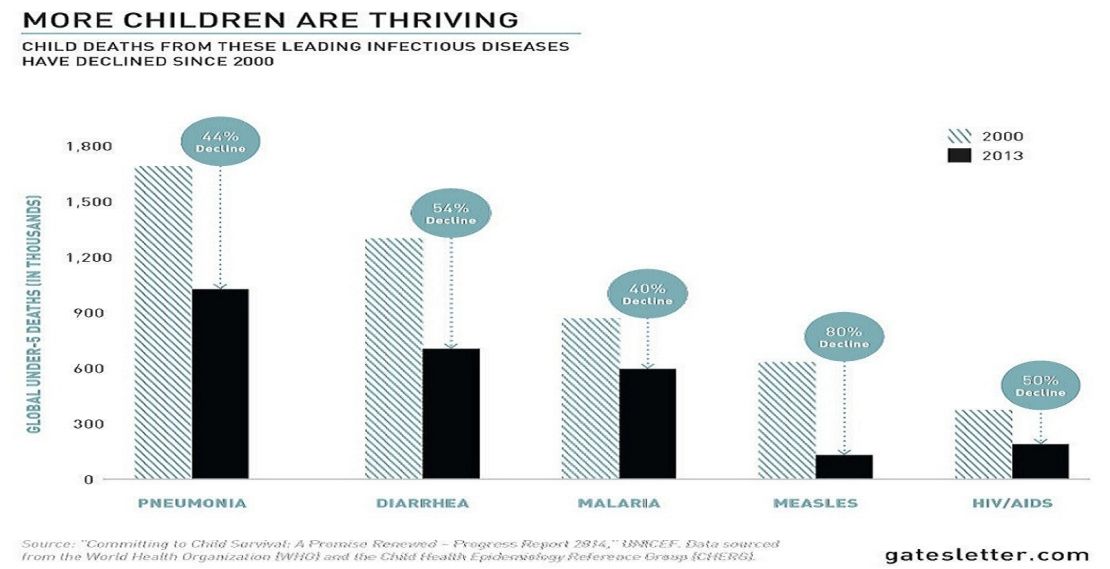Editor’s Note: The authors are co-chairs of the Bill & Melinda Gates Foundation. Their 2015 Annual Letter, from which this article was adapted, is available at www.gatesletter.com. The opinions expressed in this commentary are solely those of the authors.
Story highlights
Bill & Melinda Gates: Child deaths will fall by half by 2030
Mobile phones will give the poor more control over their assets, they say
Fifteen years ago, the two of us made a bet.
We started our foundation in 2000 with the idea that by backing innovative work in health and education, we could help billions of people improve their lives. The progress we’ve seen so far is so exciting that we are doubling down on the bet we made 15 years ago.
Here’s our bet: The lives of people in poor countries will improve faster in the next 15 years than at any other time in history. We’re putting our credibility, time and money behind this bet because we think there has never been a better time to accelerate progress and have a big impact around the world.
Here are four big breakthroughs we see coming by 2030:
First, child deaths will go down by half. In 1990, one in 10 children in the world died before age 5. Today, it’s one in 20. By 2030, it will be one in 40. Almost all countries will include vaccines for diarrhea and pneumonia, two of the biggest killers of children, in their immunization programs. Better sanitation will cut the spread of disease dramatically. And we’re learning how to help more mothers adopt practices such as proper breastfeeding and skin-to-skin contact with their babies that prevent newborns from dying in the first month after they’re born.

Second, Africa will be able to feed itself. Today, the continent has to rely on imports and food aid to feed its people, even though seven out of 10 people in sub-Saharan Africa are farmers. Part of the problem is that African farmers get just a fraction of the yields that American farmers get.
In the next 15 years, however, innovations in farming will erase these brutal ironies. With better fertilizer and hardier crops, African farmers will be able to grow a greater variety of food and sell their surpluses to supplement their family’s diet with vegetables, eggs, milk, and meat.
Even as climate change makes farmers’ job more difficult, we can get them enough innovation and information to increase productivity by 50% for the continent overall. Countries like Ghana are also building better roads and adopting policies that make it easier to move food to the places where it’s most needed. In 15 years, Africa will still import food when it makes sense to do so, but it will also export much more, eventually achieving a net positive trade balance.
Third, mobile banking will help the poor radically transform their lives. Today, some 2.5 billion people don’t have access to cheap and easy financial services – a problem that makes it much more difficult to be poor. If your savings is in the form of jewelry or livestock, for example, you can’t very well chip off tiny pieces to cover routine daily expenses.
But in the next 15 years, digital banking will give the poor more control over their assets. The key will be mobile phones. Already, in developing countries with the right regulatory framework – such as Bangladesh – people are using their phones to store money digitally and make purchases. By 2030, 8% of the adults without bank accounts today will be doing the same.
And by then, mobile money providers will be offering the full range of financial services, from interest-bearing savings accounts to credit to insurance.
Fourth, as high-speed cell networks grow and smartphones become as cheap as today’s voice-only phones, online education will flourish. Before a child even starts primary school, she will be able to use her mom’s smartphone to learn her numbers and letters. Software will be able to see when she’s having trouble with the material and adjust for her pace. Of course, software will never replace teachers. But by allowing teachers to do things like upload videos of themselves and get feedback from their peers, it can connect them in new ways.
What will it take to make sure life really does improve faster for the poor? We need advances in technology and we need to deliver them to the people who need them most. We also need to close the gender gap. Countries where girls don’t go to school or women can’t open a business will be left behind.
Another crucial factor will be people who care about helping those in the world’s poorest places improve their lives. We’re aiming to recruit millions of new advocates – we’re calling them global citizens – to urge world leaders to be ambitious when they meet in September to adopt a new set of goals that will guide the world’s efforts to tackle disease, poverty, and climate change for the next 15 years.
Beyond 2015, we hope these global citizens will hold governments and other decision-makers accountable for meeting those goals.
You can show your support by signing up at www.globalcitizen.org, where you can learn how to get engaged and connect with other organizations working to make 2015 a historic year. We believe that informed, passionate people can work together to make the world a more equitable place. In fact, we’re betting on it.
Read CNNOpinion’s new Flipboard magazine.





